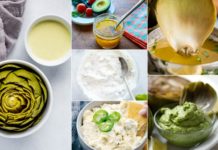Vegan nut butter – sufficient nutrients for the body
Packed with nutrients and eaten either as a spread or a dip, vegan nut butter makes a simple solution for school lunches, snacks, and more. Their growing popularity seems to be increasing with the number of available varieties. Gone are the days when peanut butter was the only choice for nutritious and nutty meals. So nowadays it’s just as easy to find delicious butter made from almonds, cashews, macadamias, or walnuts.
How does vegan nut butter affect the body?

While nut butters generally offer the same benefits as protein and healthy fats, it can also contain excess amounts of sugar or saturated fats. However, people who regularly eat vegan nuts or nut butters have a lower risk of heart disease or type 2 diabetes. Some nuts, like walnuts, are high in polyunsaturated fatty acids, which are heart-healthy fats. Possibly these play a role in lowering triglycerides, which are a type of fat in the blood. Nuts, and therefore nut butters, also contain protein, fiber, vitamins, minerals and antioxidants, which offer a variety of health benefits. But nut butters often contain large amounts of salt and sugar. Many spreads previously contained trans fats, which can raise bad LDL cholesterol levels and lower good HDL cholesterol levels.
Instead, many companies have started switching to saturated fats. For people needing to lower their cholesterol, it is best to reduce saturated fat to no more than 5% to 6% of total daily calories. Many products with trans fats are being replaced with saturated fat. You can add coconut oil, which does not contain trans fats but has the same texture as a hydrogenated oil. This is how you get this tasty, malleable and spreadable product that is similar to hydrogenated products. However, coconut oil, which is extracted from the flesh of a seed, fruit, or nut, consists mainly of saturated fat (around 82%).
Advice on healthy eating

It is a good idea to read labels and compare saturated fat, sodium, and added sugar levels. If you consume nuts and nut butters vegan, they can also be high in calories. A serving size is usually a small handful of nuts or two tablespoons of nut butter. Nutrition experts recommend diluting nut butters by combining them with other ingredients to make the bulk of a serving larger. However, you can also chop nuts and sprinkle them on low-calorie salads or vegetables. So you can enjoy some of the nutrients and taste without so many calories. You can also eat nut butter with other healthy foods such as whole grain bread, celery, apples or pears and even stir it into fat-free yogurt.
However, people with nut allergies should check with their doctor before consuming nut butter. Those who suffer from such a peanut allergy can, for example, eat sunflower seed butter or soy as a vegan nut butter. Chickpea and sesame paste hummus could also be an alternative that is a good source of protein. It’s just as important to refrigerate nut butters after opening, as like nuts, they can go rancid. Accordingly, it can make the taste unpleasant. Commercial peanut butters may contain preservatives to extend shelf life – six months to two years unopened and two to three months opened. However, the cooling can further extend their service life. However, it’s more important to refrigerate natural nut butters, which are lower in preservatives.
The post Vegan Nut Butter – Sufficient Nutrients for the Body appeared first on Deavita.com | Home ideas, design, hairstyles, make-up, lifestyle, health and beauty tips.
















